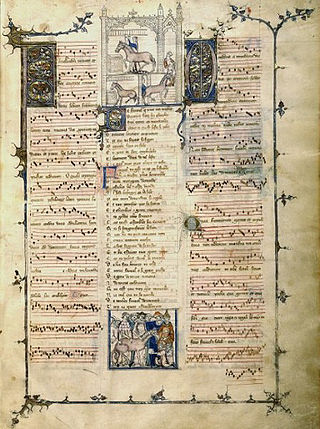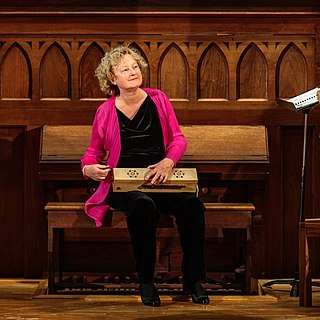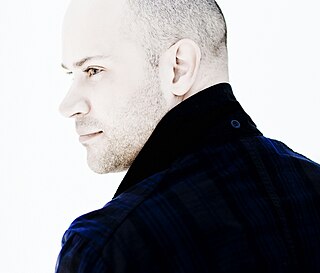Related Research Articles

Salamone Rossi or Salomone Rossi was an Italian Jewish violinist and composer. He was a transitional figure between the late Italian Renaissance period and early Baroque.

Ars nova refers to a musical style which flourished in the Kingdom of France and its surroundings during the Late Middle Ages. More particularly, it refers to the period between the preparation of the Roman de Fauvel (1310s) and the death of composer Guillaume de Machaut in 1377. The term is sometimes used more generally to refer to all European polyphonic music of the fourteenth century. For instance, the term "Italian ars nova" is sometimes used to denote the music of Francesco Landini and his compatriots, although Trecento music is the more common term for the contemporary 14th-century music in Italy. The "ars" in "ars nova" can be read as "technique", or "style". The term was first used in two musical treatises, titled Ars novae musicae by Johannes de Muris, and a collection of writings attributed to Philippe de Vitry often simply called "Ars nova" today. Musicologist Johannes Wolf first applied to the term as description of an entire era in 1904.
Joel Cohen is an American musician specializing in early music repertoires. Cohen graduated from Classical High School in Providence, Rhode Island in 1959, and Brown University in 1963. He continued graduate education at Harvard University. From 1968 to 2008, he was the director of the Boston Camerata, a prominent American early music ensemble. He remains connected to the Boston Camerata as Music Director Emeritus. Cohen founded the Camerata Mediterranea in 1990 and incorporated it as a nonprofit research institute in France in 2007. He plays the lute and guitar, as well as sings. He is best known as an organizer and creator of concert programs and sound recordings. He has also written extensively on musical topics. In recent years, Cohen's research and performance activities have centered on early American repertoires, as well as Southern European repertoires of the Middle Ages. Many of his projects in this latter category involve collaboration with Middle Eastern musicians.

Anne Azéma is a French-born soprano, scholar, and stage director. She is currently artistic director of the Boston Camerata. She has been an important or leading singer of early music since 1993. She has created and directed programs for the Boston Camerata and is also noted as a music scholar. She is perhaps best known for performing music from the Middle Ages, lute songs from the Renaissance period, Baroque sacred music, Shaker song, and contemporary music theater. She is also a music educator and a researcher. She has performed in Japan, Germany, the US, Australia and elsewhere.
Russell Keys Oberlin was an American singer and founding member of the New York Pro Musica Antiqua ensemble who became the first, and for years the only, countertenor in the United States to attain general recognition—in The New Yorker's words, "America's first star countertenor." A pioneering figure in the early music revival in the 1950s and 1960s, Oberlin sang on both sides of the Atlantic, and brought a "full, warm, vibrato-rich tone" to his recitals, recordings, and his performances in works ranging from the thirteenth-century liturgical drama The Play of Daniel to the twentieth-century opera A Midsummer Night's Dream.
The Lamentations of Jeremiah the Prophet have been set by various composers.
The Harp Consort is an international early music ensemble directed by Andrew Lawrence-King, specialising in Baroque opera, early dance-music, and historical World Music.
The Tournai Mass is a polyphonic setting of the mass from 14th-century France. It is preserved in a manuscript from the library of the Tournai Cathedral.

Bejun Mehta is an American countertenor. He has been awarded the Echo Klassik, the Gramophone Award, Le Diamant d’Opera Magazine, the Choc de Classica, the Traetta Prize, and been nominated for the Grammy Award, the Laurence Olivier Award, and the Preis der Deutschen Schallplattenkritik. Writing in the Süddeutsche Zeitung, Michael Stallknecht called him "arguably the best counter tenor in the world today."

Hortus Musicus is an Estonian ensemble that was established in 1972 by Andres Mustonen, a violin student of the Tallinn State Conservatory. Hortus Musicus specialises in performing early music, including 8th–15th-century European forms such as Gregorian Chant, Organum, Medieval Liturgic Hymns and Motets, the Franco-Flemish School, and Renaissance Music. The group also presents early, non-European styles including Indian Ragas, Israeli temple songs, Arabian mughams and Jewish music. The group's repertoire has also included pieces by 20th-century composers.
Crawford Young is an American lutenist and musicologist residing in Basel, Switzerland. He is the director of the Ferrara Ensemble, Ensemble Project Ars Nova, Shield of Harmony, and is a long time accompanist of Andreas Scholl.
The Boston Camerata is an early music ensemble based in Boston, Massachusetts. It was founded in 1954 by Narcissa Williamson, at the Museum of Fine Arts, Boston, as an adjunct to that museum's musical instrument collection.

Pablo Heras-Casado is a Spanish conductor.

This is a discography of Hildegard of Bingen's musical works.
Guillaume Bouzignac was a French composer.
Le Jeu d'Adam is a twelfth-century liturgical drama written in the Anglo Norman dialect of Medieval French. While choral texts and stage directions are in Latin, the spoken text of the play is in the vernacular, which makes Adam the oldest extant play written in any old French dialect. It is a dramatic representation of the temptation and fall of Adam and Eve, the story of Cain and Abel, and a series of prophets including Isaiah and Daniel. The latter part of the play is largely taken from the Latin Sermo Contra Judaeos, Paganos et Arianos, attributed to pseudo-Augustine. It is part of the medieval tradition of mystery plays, which developed from dramatic elements in the celebration of Mass, and includes choral music.

Add MS 29987 is a mediaeval Tuscan musical manuscript dating from the late fourteenth or early fifteenth century, held in the British Library in London. It contains a number of polyphonic Italian Trecento madrigals, ballate, sacred mass movements, and motets, and 15 untexted monophonic instrumental dances, which are among the earliest purely instrumental pieces in the Western musical tradition. The manuscript apparently belonged to the de' Medici family in the fifteenth century, and by 1670 was in the possession of Carlo di Tommaso Strozzi; it was in the British Museum from 1876, where it was catalogued as item 29987 of the Additional manuscripts series. It is now in the British Library.

Joel Frederiksen is an American bass singer and lutenist based in Germany, and director of the early music Ensemble Phoenix Munich. He has released award-winning CDs with Harmonia Mundi France and SONY/Deutsche Harmonia Mundi. He studied for a master's degree in Early Music at Oakland University where he was the recipient of numerous awards including "Distinguished Musicianship", "Matilda Award" and the "Distinguished Alumni Achievement Award". From 1990 to 1999 while living in New York City he was a member of the Waverly Consort and the Boston Camerata.
Jill Feldman is an American soprano who has acquired an international reputation for her interpretation of medieval, baroque and classical repertoires.
Nicolas Rivenq is a contemporary French baritone.
References
- ↑ "The Play Of Daniel | Encyclopedia.com".
- ↑ Eugene, Enrico. "The Play of Daniel: European Music Series". Oklahoma: The University of Oklahoma. Retrieved 2009-11-18.
- ↑ Joseph Kerman, Contemplating Music. Harvard, 1985, p. 195.
- ↑ "Play of Daniel: Songs of Peace". Songs of Peace Online. Retrieved 2009-11-18.